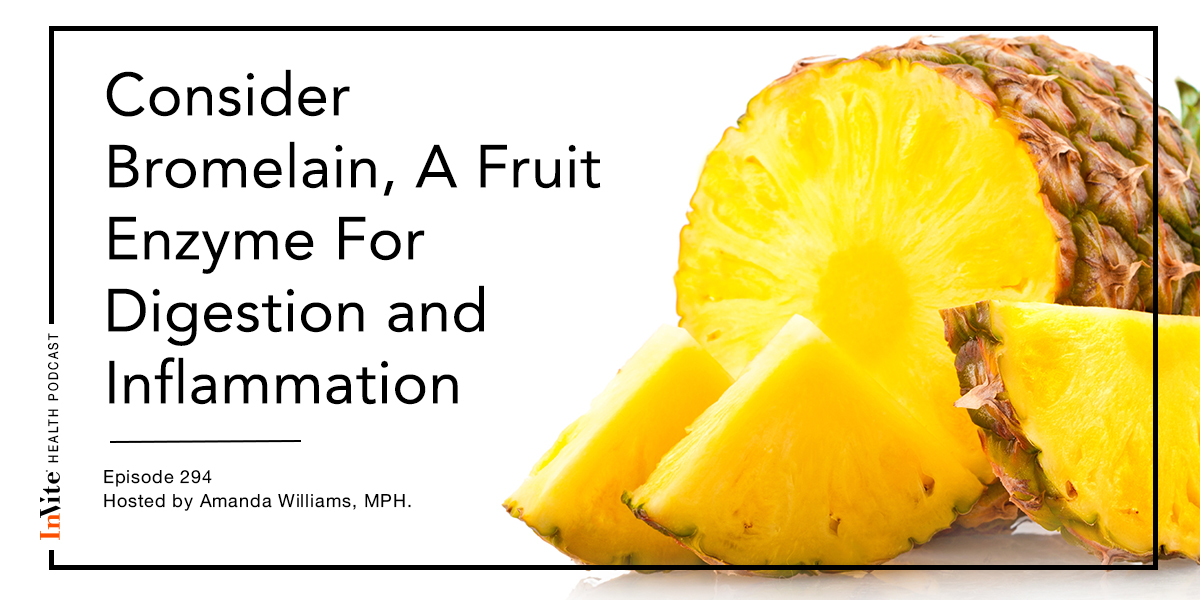Invite Health Podcast, Episode hosted by Amanda Williams, MPH.
Subscribe Today!
Phytochemical compounds are a very intriguing area of research when it comes to nutritional medicine, as well as mainstream medicine. One particular food-based nutrient that is highly regarded as having so many different medicinal purposes in the human body is bromelain. Bromelain is one of my favorites to keep up to date with the research because it has been around for so long and it is so well-regarded in the scientific community with all of its different properties. I want to talk about that in some detail today and give you some background on what bromelain actually is.
What is Bromelain?
Bromelain is this complex mixture of different proteases. Proteases, or proteolytic enzymes, aid in the breakdown of proteins in the body. This is beneficial. This is why we come naturally-equipped with protease. When we’re digesting food, for example, they aid in that initial breakdown.
Clinically Studied Strains Of Bacteria to Support Overall Health – InVite Health Podcast, Episode 288. Listen Now >>
Bromelain is extracted from the stem of the pineapple which is why, for many people, when they eat pineapple, they may feel like their digestive system is more responsive. Keep in mind, you are getting bromelain from the actual fruit itself, but the majority of that very powerful constituent of those mixed-blend proteases are coming from the stem itself.
Learn about the historical background of bromelain by tuning into the full podcast episode.
The Various Benefits of Bromelain
It’s really quite interesting when we think about proteolytic enzymes and how incredibly important they are when it comes to so many different functions in the human body. When we think about bromelain belonging to this group of digestive enzymes, for example, then we can say that it is good for the GI tract.
But we also recognize that bromelain has many other different compounds that actually help to potentiate these powerful health benefits. It has things like phosphatase, glucosidase, peroxidase, cellulase and all of these different proteases. What we know is that the body can absorb a significant amount of bromelain, which is very important because when we’re taking bromelain as a supplement, there are different reasons as to why you would be taking it and how you would take it. This makes a big difference.

Researchers did a study back in 1997 published in the American Journal of Physiology where they were looking at the intestinal absorption of undegraded protein, as well as the presence of bromelain and what that would actually do. They found that when they gave people bromelain, this actually helped in terms of a significant intestinal transport of those undegraded proteins, which is really key. It was showing that proteolytic property.
We also know that when we are utilizing bromelain, because it’s targeting all these different pathways, that it’s actually very beneficial for targeting inflammation. We know one thing about inflammation is that chronic low-grade inflammation is that driving force to each and every single chronic disease out there. When we are thinking about something from nature that can aid in digestion but can also target inflammation, this is why bromelain is touted as being, in a sense, a kind of superfood in its own right.
Listen to the full podcast episode for more details on the research behind the benefits of bromelain.
Key Nutrients for Common Digestive Health Concerns – Invite Health Podcast, Episode 114. Listen Now >>
Supplementation
I am a fan of using bromelain as a supplement a couple of different ways. One is for digestion. If someone has a heavy protein meal, like a steak, then they would want to take that bromelain along with that food because it will help with that processing down of that protein. If we are talking about inflammation, I always recommend taking the bromelain on an empty stomach so we can really get those powerful proteases, as well as all those other compounds, into the bloodstream more effectively. In doing that, you will be able to better target those avenues for inflammation, as well as giving a heightened ability for the immune system to respond more properly.
Thank you for tuning in to the Invite Health Podcast. You can find all of our episodes for free wherever you listen to podcasts or by visiting www.invitehealth.com/podcast. Make sure you subscribe and leave us a review! Follow us on Facebook, Twitter and Instagram at Invite Health today. We’ll see you next time on another episode of the Invite Health Podcast!











